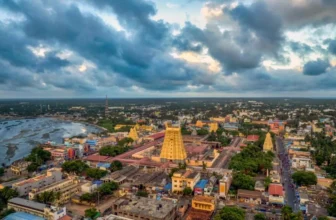🪞The Art of “Satiating Mirrors”: Why Some Cultures Cover Mirrors After a Death
In various cultures across the world, there’s a quiet, mysterious ritual observed after someone dies: covering all the mirrors in the home. While it might seem superstitious or symbolic at first glance, this ancient tradition—practiced in parts of Eastern Europe, Jewish customs, and certain Asian households—actually reveals fascinating insights into grief psychology, social behavior, and visual perception.
Let’s uncover what lies behind the covered mirror.
🕯️ Where is This Practiced?
1. Jewish Tradition
During Shiva—a seven-day mourning period—mirrors in the home of the deceased are covered. This is done right after death and remains until the period concludes.
2. Slavic and Balkan Traditions
In some rural areas of Russia, Poland, and the Balkans, mirrors are covered or turned to face the wall until after the funeral.
3. Chinese Customs
In Taoist-influenced traditions, mirrors are covered during mourning to prevent ghosts from becoming trapped or frightening the living.
4. Victorian-Era Europe
In 19th-century Britain, especially among the upper class, it was common practice to cover mirrors when someone in the household died.
Despite variations, the underlying concept remains consistent: mirrors and death do not mix—but why?
🧠 The Science and Psychology Behind the Ritual
1. Disruption of Self-Image and Identity
After a death, especially of someone close, mourners can experience a temporary loss of identity or role—particularly spouses or children. Seeing oneself in the mirror during intense grief can intensify a sense of alienation or dissociation.
- Research in grief psychology shows that visual self-confrontation (like seeing your reflection) during acute mourning can exacerbate emotional distress.
- Covering mirrors may offer a temporary break from self-evaluation during this emotionally raw period.
2. Minimizing Vanity During Mourning
In Jewish custom, the mirror is covered not out of fear—but to discourage concern with physical appearance during mourning. The emphasis shifts inward, toward reflection on life, loss, and legacy—not outward beauty.
This aligns with the broader human behavior observed in grief: a natural pull toward introspection and reduced self-focus.
3. Avoiding Mirror-Induced Hallucinations (The “Troxler Effect”)
Under low light and emotional stress, staring at one’s reflection can lead to mild hallucinations or visual distortions—a phenomenon called the Troxler Effect.
- In dim settings, your brain begins to “fill in the gaps”, sometimes causing your face to appear distorted or replaced.
- This has been linked to feelings of unease or fear when mirrors are uncovered during death rituals.
Covering mirrors, then, could be a culturally evolved way to protect vulnerable minds from such psychological effects.
🔮 The Symbolism of Mirrors in Culture
Mirrors are not just household objects—they’ve long been seen as:
- Portals between worlds
- Reflectors of the soul
- Bearers of truth or illusion
In many traditions:
- A mirror may “trap the soul” of the deceased if left uncovered.
- Seeing the reflection of a mourner may invite bad luck or death.
- Mirrors are thought to be too “alive” in a space filled with death.
While these ideas are symbolic, they point to a common truth: humans instinctively sense the power of reflection—both literal and metaphorical—especially when navigating major emotional transitions.
🧭 A Reflection of Grief and Healing
Covering mirrors during mourning may seem like a superstition—but it beautifully merges cultural respect, emotional sensitivity, and neurological insight. It offers space to grieve without confrontation, to exist without judgment, and to honor the moment with quiet reverence.
Sometimes, not seeing is a deeper form of seeing.










